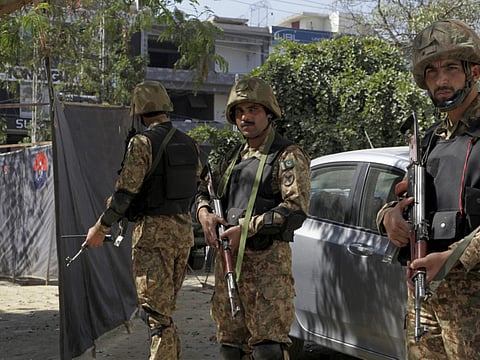Tackling security challenges in Pakistan
Now that a nationwide campaign against militancy has been launched, its vital that urgent medium and long-term measures to begin reducing poverty are also initiated

A spate of terrorist bombings across Pakistan this month have once again highlighted the continuing security threats to south Asia’s second-largest country. In the past week, the country’s civil and military rulers have ordered army troops to launch a new nationwide crackdown against militants, their backers and facilitators, in a new campaign whose outcome is hard to predict.
Once concluded, the campaign is meant to plug the many holes that stand at the heart of Pakistan’s failure in curbing terrorism. From pas records, it is clear that Pakistan runs the risk of over-simplifying the solutions to challenges that are clearly monumental and multi-dimensional.
To long-term observers of Pakistan’s security framework, its evident that the country’s exposure to the fallout of the war in Afghanistan has thrown up a host of tough challenges. These include the fallout from a proliferation of Islamic schools to a porous border that allows militants undeterred cross-border travel.
However, Pakistan’s worsening crisis of governance that has practically ended the writ of the state in parts of the country is where the future is likely to be decided. In the short term, the military-led crackdown will likely conclude with casualties among members of militant groups. But the danger is that of the targeted militant factions becoming weakened without losing their ability to make a comeback.
The military offensive will likely become another chapter in a long battle between the Pakistani state and hardline groups — unless such a campaign is backed by clear and decisive action on three key fronts:
First, Pakistan’s state organs — notably its civil administration, police and the political structure — are all in need of fundamental reforms. An ill-advised dismantling of the once-effective civil service in the name of devolving authority to elected representatives at the grass roots has made the civil service simply ineffective. The experiment undertaken during the tenure of former president General Pervez Musharraf simply failed. Accompanying that malaise has been a clear-cut erosion in the workings of the police, where authority of senior officials has been compromised — thanks in part to an ever-growing interference by political representatives, who have sought to increase their clout, only to push their self-interests as the civil administration and the police have increasingly lost independence. Clearly, there will have to be a moment of handing over of authority once the army-led operation concludes. Also, exactly who will take charge of territory pulled back from militant groups remains a compelling question.
Second, Pakistan needs a raft of major policy reforms to not only support the campaign against terror, but also to sustain its outcome. As the troops head out to target militant sanctuaries, the huge gaps in Pakistan’s financial structure need to be addressed urgently. The powerful reality of a large black economy and the presence of a very narrow band of taxpayers clearly need to be changed. The black economy provides the framework for criminals to thrive and the paucity of taxpayers — less than one per cent of Pakistanis pay income tax — leaves a vast majority whose activities are completely unknown. On related matters, the continuing immunity given to onshore foreign currency account holders from revealing their source of funds, essentially means that there are convenient safe havens for potentially dodgy individuals. All these gaps need to be tackled urgently so that the financiers of criminal and militant causes are taken to task.
And finally, any action against militants will remain inconsequential unless backed by urgent measures to begin long-delayed developmental and societal reforms. Almost one-third of Pakistan’s population, or at least 60 million or more people, live in extreme poverty. That in itself is an explosive situation for the security environment of any country. In Pakistan, such a large population of impoverished individuals suggests that there is ample human fodder for militant groups to absorb in their ranks. For years, successive governments have failed to give anything more than mere lip service to tackling the widespread impoverishment of Pakistan’s people. Now that a nationwide campaign against militancy has been launched, its vital that urgent medium and long-term measures to begin reducing poverty are also initiated.
Ultimately, Pakistan’s leaders are in need of immediately changing their own direction and that of the country’s to take this campaign to a successful end. Tragically, however, ongoing trends spanning over recent years only provide evidence of the detachment of Pakistan’s leaders from the country’s pressing challenges.
The ruling structure in Islamabad appears to have been primarily obsessed with defending Prime Minister Nawaz Sharif and his three children over questions of the discovery of massive overseas wealth, as revealed in the so called ‘Panama leaks’.
Beyond this specific matter, the ruling structure appears to be hooked up more to priorities that should not be the primary objective, given the enormity of challenges faced by Pakistan. Building high-speed roads and air-conditioned buses plying on elevated platforms in urban areas seem to address the development agenda of the government at the cost of ignoring far more pressing issues such as the need to build more large dams for storage of water and generation of affordable hydel power. Notwithstanding the frequent official claims of ‘sub achha’ (all’s well), there are plenty of examples all across Pakistan of government-owned schools and hospitals lying in disrepair.
The writing on the wall is abundantly clear: Without long overdue reforms to benefit the people of Pakistan, there is a risk of militancy remaining well-entrenched, even after the army-led campaign comes to a conclusion.
Farhan Bokhari is a Pakistan-based commentator who writes on political and economic matters.


